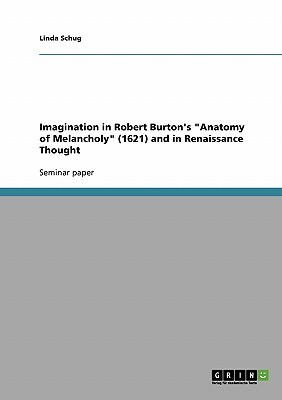
- We will send in 10–14 business days.
- Author: Linda Schug
- Publisher: GRIN Verlag
- Year: 2009
- Pages: 56
- ISBN-10: 3640237943
- ISBN-13: 9783640237944
- Format: 14.8 x 21 x 0.3 cm, minkšti viršeliai
- Language: English
- SAVE -10% with code: EXTRA
Imagination in Robert Burton's Anatomy of Melancholy (1621) and in Renaissance Thought (e-book) (used book) | bookbook.eu
Reviews
Description
Seminar paper from the year 2003 in the subject English Language and Literature Studies - Literature, grade: 2,7, University of Frankfurt (Main), course: Englische Prosa des 17. Jahrhunderts: Robert Burton und Sir Thomas Browne, language: English, abstract: The word 'imagination' has and had various meanings as this extract from The Oxford English Dictionary illustrates: 1. The action of imagining, or forming a mental concept of what is not actually present to the senses [...]; the result of this process, a mental image or idea (often with implication that the conception does not correspond to the reality of things, hence freq. vain (false, etc.) imagination [...] 2. The mental consideration of actions or events not yet in existence a. Scheming or devising; a device, contrivance, plan, scheme, plot, a fancyful project [...] b. Impression as to what is likely; expectation, anticipation. [...] These are the definitions that existed in the Renaissance period. But as I am going to show in my essay with the example of Robert Burton's The Anatomy of Melancholy (1621), imagination played a more influential role during that period and was believed to have and had a big impact on different spheres of life. Of course, there was no homogeneous opinion about its influence. As Katherine Park notes, the debate over the force of imagination 'was complicated by the fact that the most ardent defenders of the power of imagination included both the most credulous - writers like Paracelsus who would believe any story - as well as the least superstitious - writers like Pomponazzi and Montaigne for whom the imagination provided a credible and natural explanation for some of the more far-fetched claims of popular magic and religion.' (Huet 14) So I will point out to what extent Burton's ideas about it correspond to the views of his contemporaries and also how far they are more influenced by tradition. I am going to start with a passage about the contemporary development of the sci
EXTRA 10 % discount with code: EXTRA
The promotion ends in 23d.06:27:13
The discount code is valid when purchasing from 10 €. Discounts do not stack.
- Author: Linda Schug
- Publisher: GRIN Verlag
- Year: 2009
- Pages: 56
- ISBN-10: 3640237943
- ISBN-13: 9783640237944
- Format: 14.8 x 21 x 0.3 cm, minkšti viršeliai
- Language: English English
Seminar paper from the year 2003 in the subject English Language and Literature Studies - Literature, grade: 2,7, University of Frankfurt (Main), course: Englische Prosa des 17. Jahrhunderts: Robert Burton und Sir Thomas Browne, language: English, abstract: The word 'imagination' has and had various meanings as this extract from The Oxford English Dictionary illustrates: 1. The action of imagining, or forming a mental concept of what is not actually present to the senses [...]; the result of this process, a mental image or idea (often with implication that the conception does not correspond to the reality of things, hence freq. vain (false, etc.) imagination [...] 2. The mental consideration of actions or events not yet in existence a. Scheming or devising; a device, contrivance, plan, scheme, plot, a fancyful project [...] b. Impression as to what is likely; expectation, anticipation. [...] These are the definitions that existed in the Renaissance period. But as I am going to show in my essay with the example of Robert Burton's The Anatomy of Melancholy (1621), imagination played a more influential role during that period and was believed to have and had a big impact on different spheres of life. Of course, there was no homogeneous opinion about its influence. As Katherine Park notes, the debate over the force of imagination 'was complicated by the fact that the most ardent defenders of the power of imagination included both the most credulous - writers like Paracelsus who would believe any story - as well as the least superstitious - writers like Pomponazzi and Montaigne for whom the imagination provided a credible and natural explanation for some of the more far-fetched claims of popular magic and religion.' (Huet 14) So I will point out to what extent Burton's ideas about it correspond to the views of his contemporaries and also how far they are more influenced by tradition. I am going to start with a passage about the contemporary development of the sci


Reviews